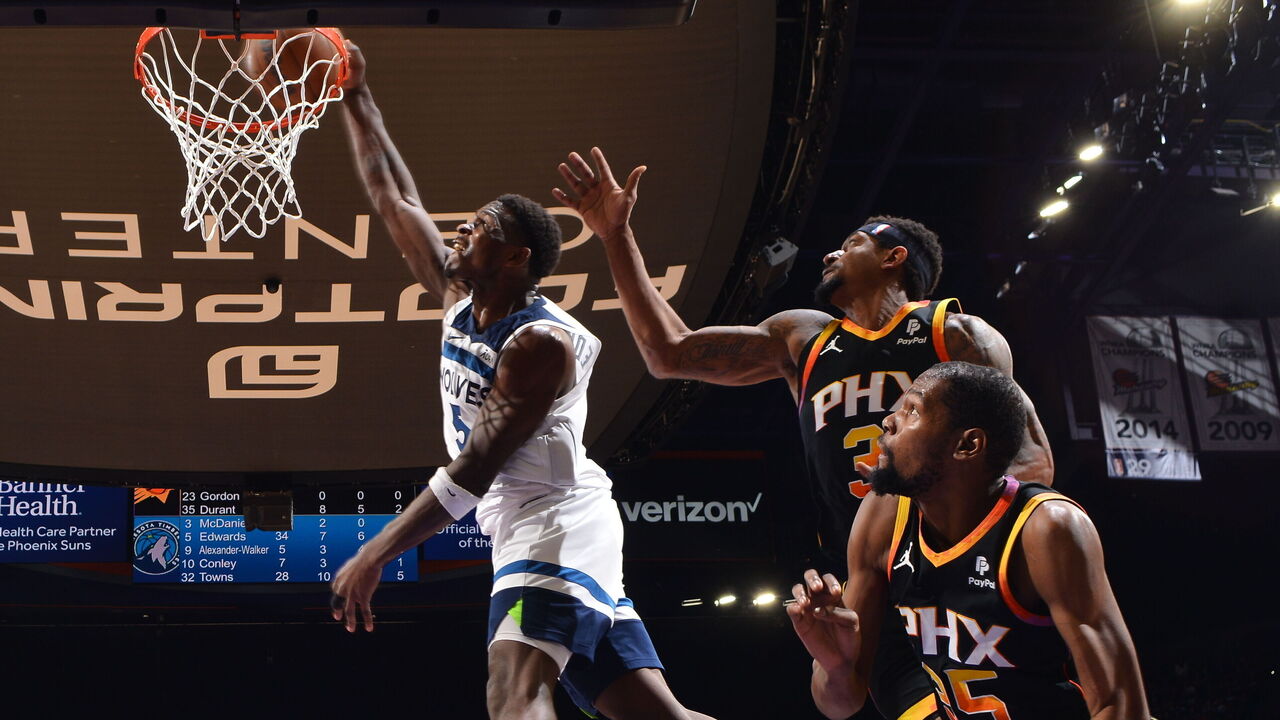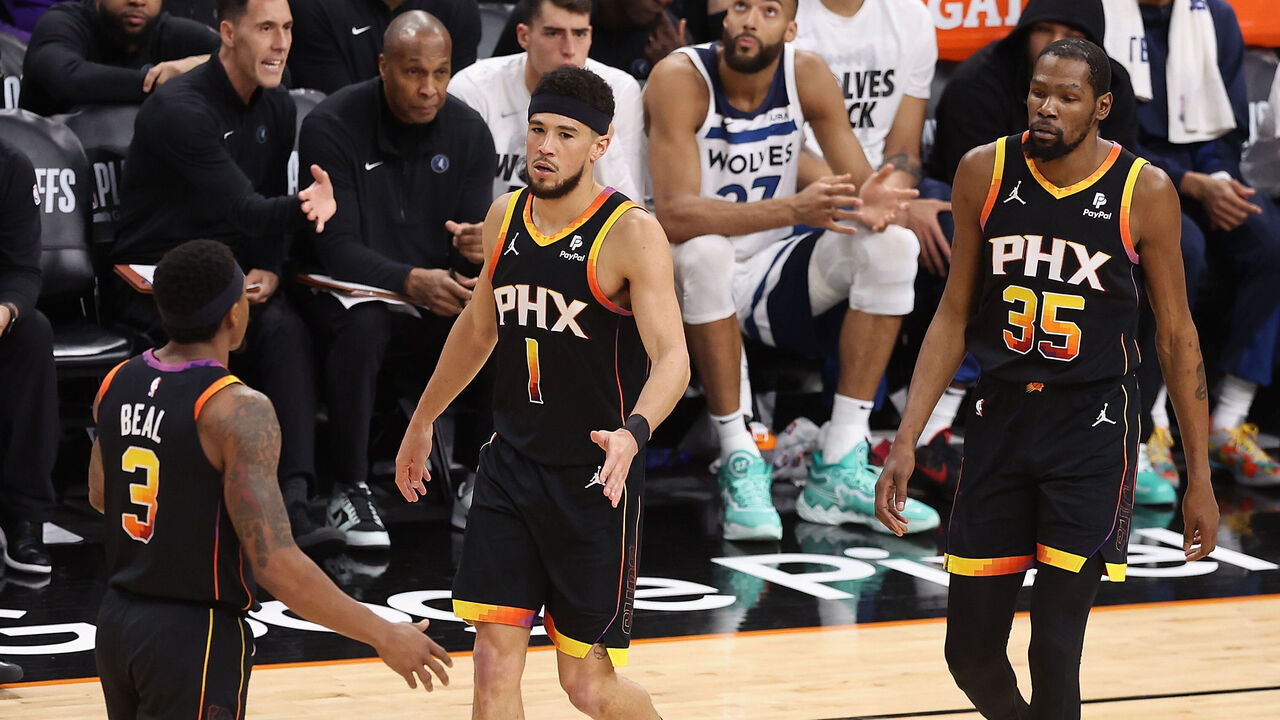The Wolves' vindication is the Suns' shame
A year removed from their own bitter disappointment, perhaps the Timberwolves can empathize with what the Suns are currently feeling - even if their future didn't feel as bleak as Phoenix's does now.
Last year, it was the Wolves who were the butt of the joke, the team going home after a short first-round series, the team whose massive trade gamble - sensible as it may have been - appeared to have flopped.
In their first season with Rudy Gobert, the Wolves struggled to find an identity, lost Karl-Anthony Towns for four months, and failed to climb more than two games above .500. They showed encouraging progress down the stretch, with Mike Conley looking like a perfect trade-deadline addition, Gobert rediscovering his All-Defensive form, Jaden McDaniels blossoming, and Anthony Edwards capably shepherding the offense in Towns' stead.
But then the season ended with Naz Reid getting hurt, the team suspending Gobert for blowing up at Kyle Anderson, McDaniels breaking his hand punching a wall, and Minnesota bowing out of the first round in five games (despite Edwards' best efforts) against the Denver buzz saw.
They ran back almost the exact same roster this season, and everything clicked. Edwards took another leap as a defender, playmaker, and mid-range scorer. Gobert was the NBA's most impactful defensive player from the jump. Conley remained one of the steadiest hands in the game, and his two-man synergy with Gobert bailed the Wolves out of plenty of jams. Towns got more comfortable playing the four next to Gobert and became one of the league's most improved defenders. So did Nickeil Alexander-Walker, who emerged as an invaluable reserve to complement Reid, the newly minted Sixth Man of the Year.
A 56-win campaign underpinned by one of the best defenses in modern NBA history didn't fully quell doubts about the Wolves' playoff viability, especially against a star-powered Suns team that swept their season series. Towns and Gobert had some serious playoff baggage to shed at the offensive end of the floor. Edwards cooked last year against the Nuggets but is still only 22. How would a team built on size and interior defense fare against a shooting-laden squad like Phoenix?
We quickly got our answer. The Wolves won the series' first three games by an average margin of 18 points, then gutted out a nail-biter to complete the sweep on the road. They held the Suns' offense 7.5 points per 100 possessions below its regular-season average. McDaniels and Alexander-Walker took turns hounding Devin Booker around screens, while Edwards harassed Bradley Beal. Towns took on the primary Kevin Durant assignment and largely held his own, at least long enough to pass the matchup onto McDaniels when Alexander-Walker would check in to take over Booker duties.
The Wolves pressured those three up and down the court, forced them into bushels of turnovers, chased them off the arc (Phoenix's 3-point attempt rate is the lowest of any first-round team), and funneled them into Gobert's help. Gobert predictably locked down the paint but also demonstrated his underrated coverage versatility, frequently stepping out of his base drop to show at the level or outright switch. He validated the Defensive Player of the Year award that is assuredly coming his way.
At the other end, a Wolves offense that loomed as a question mark coming into the playoffs poured in a league-leading 123.2 points per 100. The Suns finished the regular season tied for 12th in defensive rating but always felt like overperformers in that regard, and it showed. They had no answer for Edwards, who averaged 31-8-6 on 51/44/84 shooting in the series. He did that despite the Suns, due to their lack of good individual options, shading aggressive gap help and overloading the strong side almost any time he handled the ball up top. In pick-and-roll, they showed high and occasionally blitzed him.

Edwards demonstrated his maturation as an offensive player by not forcing anything. When the Suns dialed back their help, he torched them in isolation. When they showed aggressive coverages at either the first or second level of their defense, he made simple reads and passes, trusting his teammates would either capitalize on the advantage themselves or get the ball back to him in a more dangerous scoring position later in the possession. He also demonstrated his growth as a playmaker by wrong-footing Phoenix's rotations with some look-away darts and unexpected skips to the weak side. His assist total doesn't do justice to what he enabled as a facilitator.
The rest of the Wolves helped make his maturation pay off. Whether it was Towns playing in the flow and feasting off spot-ups and off-the-catch drives, Conley organizing the offense putting the Suns in rotation when Edwards got off the ball, Gobert punishing size mismatches on the offensive glass and showing he's become a pretty decent short-roll playmaker, McDaniels gashing the tilted defense from the second side, or Alexander-Walker drilling timely threes, Minnesota got key offensive contributions from its whole rotation.
That's the exact opposite of what Phoenix got, especially after Grayson Allen went down with an ankle sprain in Game 2. That wasn't exactly a series-swinging injury, but it had an outsized impact because of how top-heavy the Suns were. (Playing Eric Gordon 39 minutes is not the way to win playoff games in 2024.) Booker finally shook loose in Game 4, combining with Durant for 82 points on 25-of-38 shooting, and it still wasn't enough. No other Sun cracked double digits in the game; Beal finished with as many turnovers (six) as made field goals and assists combined.
Minnesota completely overwhelmed Phoenix with its size and athleticism, a mental and physical toll that became evident as every game progressed. The Wolves outscored the Suns by 50 points in the second halves of the four games.
So, where exactly do the Suns go from here?
To take it back to where Minnesota sat at this time last year, things can change a lot from year to year, especially for teams that made roster-shaking trades. Like those Wolves, the Suns struggled to find an identity while playing without a key player for nearly half the season, and never threatened to climb into the West's top half. They also showed encouraging progress down the stretch - with Royce O'Neale looking like a great trade-deadline addition - before their season ended in stylistic disarray, locker-room disharmony, and a hasty playoff exit against a buzz saw.
If those parallels feel like reaches, it's because they are. Even if it's easy to forget how down everyone was on Minnesota after last season, it's much harder to see Phoenix finding similar vindication for its all-in moves. There was a lot for the Wolves to build on and feel optimistic about going into last offseason. But it's hard to feel any optimism about a team that owes $151 million to three players next season and failed to win a single playoff game with all of them healthy. Especially when one of them turns 36 this summer, another looks over the hill at 30, and none have shown the ability to consistently amplify the other two.

With midsize salaries also owed to Allen and Jusuf Nurkic, the Suns project to be over the debilitating second tax apron, and their depth is already nonexistent. There's little hope of bolstering that depth in the draft, as they've moved every piece of tradable capital outside of this year's first-rounder. The Wolves' big trade was a bet on Edwards and McDaniels as much as it was on Gobert. Booker is squarely in his prime at 27, but the Suns don't have nearly the same level of young talent to believe in. Financial relief isn't coming anytime soon, either, with the whole starting lineup under contract through at least 2025-26, and Beal holding a $57-million player option in 2026-27.
The Suns got Durant's healthiest season in a decade; he ranked sixth in the NBA in total minutes played and averaged 27-7-5 on 52/41/86 shooting while continuing to defend at a high level. Booker put up comparable counting stats and made further inroads as a playmaker while filling the role of nominal point guard. Nurkic also had his healthiest season in years, and while his struggles as a finisher and defender in space were evident, his rebounding and passing were vital. The Suns outscored opponents by 9.2 points per 100 with him on the floor. Allen shot 46% from deep and proved he could hold up pretty well defensively. There were moments in which this team zipped the ball around and defended their butts off and played truly inspired basketball.
Those should all feel like encouraging signs, but instead they make Phoenix's ho-hum regular season and disastrous playoff showing feel even more depressing. The Suns' core group is much more likely to get worse than better, and they have minimal flexibility to rearrange or augment it. Even as Durant continues to compile impressive numbers, his ability to impact winning in the postseason seems to wane every year. This was the second time in three years his team's been swept in the first round, despite him having Booker and Kyrie Irving as co-stars.
There's no sense in relitigating all the moves that brought the Suns here. The Durant trade stripped them of the majority of their long-term assets and set them down this path, but many considered it a worthwhile gamble given how Phoenix was petering out following its 2021 Finals run and 64-win follow-up campaign. The trade that brought in Nurkic and Allen for a disgruntled Deandre Ayton was a net positive. And while there was more potential downside in trading for Beal than in simply eating what remained of Chris Paul's partially guaranteed contract or trying to trade him for someone cheaper, doing the latter probably wouldn't have put them in a better spot this season. The Wizards wound up flipping Paul for Jordan Poole, after all.
Like it or not, once you trade for a mid-30s superstar, trying to maximize his twilight years becomes an organizational mandate. Unfortunately, the Suns' efforts to do so have left them with not only a bleak future but a decidedly underwhelming present. No coaching change, marginal roster move, or schematic adjustment is likely to change that.